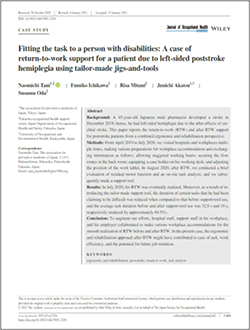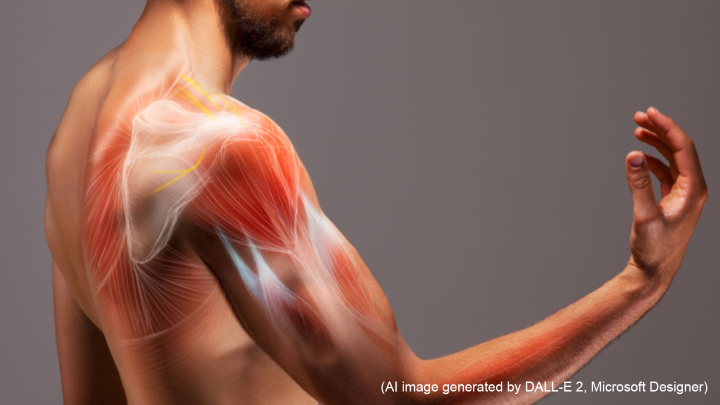#0113 Fitting the task to a person with disabilities: A case of return-to-work support for a patient due to left-sided poststroke hemiplegia using tailor-made jigs-and-tools

Personalized Accommodations Make it Easier to Return to Work After a Stroke
A stroke is often a devastating event that can leave the affected person severely disabled. Stroke-related disability can have a substantial adverse effect on an individual’s ability to work effectively, and thus, return-to-work is considered a key recovery milestone in poststroke rehabilitation. In Japan, occupational health support centers provide extensive support to stroke survivors and their employers to facilitate return-to-work by providing necessary workplace accommodations.
To illustrate the poststroke return-to-work support services available in Japan, we conducted a case study on the workplace accommodations for a 45-year-old pharmacist who experienced a stroke in December 2018. After the stroke, he developed left-sided spastic hemiplegia, which is a neuromuscular disorder characterized by a combination of paralysis and irregular reflex activity affecting half of the body. Despite this disability, he was eager to return to work, so his manager at the pharmacy requested support from the Fukuoka Occupational Health Support Center Fukuoka Occupational Health Support Center (FOHSC) in April 2019.
Following this request, the FOHSC began collaborating with hospital staff, including physicians, nurses, physical therapists, occupational therapists, and medical social workers, and the support staff at the pharmacy to ensure a smooth return-to-work for the pharmacist. After an extensive planning process, the FOHSC developed a return-to-work support plan that included allowing staggered working hours, minimizing the presence of physical obstructions in the back room, installing a cane holder at his working desk, and adjusting the position of his work tablet.
With these accommodations in place, the pharmacist returned to work in July 2020. In August 2020, FOHSC personnel, after evaluating the pharmacist’s residual motor function and performing an on-site task analysis, provided a tailor-made support tool that reduced the durations of various tasks that the pharmacist had reported having difficulty performing.
In conclusion, our case study exemplifies the good return-to-work outcomes that are achievable through collaborations between hospital staff, worksite support personnel, and employers. The accommodations provided to the pharmacist made it easier for him to perform his work tasks and improved his work efficiency and the potential for job retention.

Link to the original journal article:
https://onlinelibrary.wiley.com/doi/10.1002/1348-9585.12201
Title of the paper:
Fitting the task to a person with disabilities: A case of return-to-work support for a patient due to left-sided poststroke hemiplegia using tailor-made jigs-and-tools
Authors:
Naomichi Tani, Fumiko Ichikawa, Risa Mitani, Junichi Akatsu, and Susumu Oda




